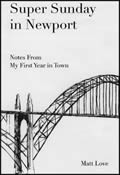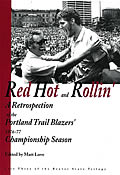 Fast Break, a film documentary about Bill Walton and the Portland Trail Blazers winning the 1976-77 NBA title and the aftermath of their accomplishment, is the greatest movie I have ever seen on the subject of professional team sports, basketball as a metaphor for life, and the perfect practice of Zen Buddhism in American society.
Fast Break, a film documentary about Bill Walton and the Portland Trail Blazers winning the 1976-77 NBA title and the aftermath of their accomplishment, is the greatest movie I have ever seen on the subject of professional team sports, basketball as a metaphor for life, and the perfect practice of Zen Buddhism in American society.
It also might be the best movie ever made in Oregon and about Oregon. It certainly is the best stoner movie in Oregon history.
If you call yourself a real Oregonian, you simply must see Fast Break, even if you don't care the least for pro sports or give a damn about the current version of the Trail Blazers, meaning you're just like me.
On October 24-26 at the Clinton Street Theater in SE Portland, true Oregonians will have a chance to see this incredible documentary and relive one the greatest cultural moments in the state's history. If you were living in Oregon during the championship season and were halfway sentient, then you know exactly what I mean. The feeling was called Blazermania and it was a good kind of social disease.
Fast Break is prima facie a documentary, but really it's more of a stoned contemplation of a subject than anything else. That its subject was a professional basketball team led by its counterculture star center unselfishly winning an NBA Title in 1977 just makes the film's treatment of the content all the more incredible and quintessentially Oregon.
I learned of its existence in 2006 from Larry Colton's book Idol Time, tracked it to an Oregon Historical Society warehouse in Gresham where it had lain entombed since 2001, miraculously acquired a copy, viewed it, had my mind blown, and became obsessed with resurrecting Fast Break no matter what price it exacted on my bank account.
 Let me tell you, it was a high price but worth every penny. In 2007, I published Red Hot and Rollin': A Retrospection of the Portland Trail Blazers' 1976-77 NBA Championship Season and included a DVD of Fast Break. The book was an Oregon hit and Powell's bestseller. After readers watched the film, they often wrote or called me in utter astonishment: What is the story of this film and its filmmaker?
Let me tell you, it was a high price but worth every penny. In 2007, I published Red Hot and Rollin': A Retrospection of the Portland Trail Blazers' 1976-77 NBA Championship Season and included a DVD of Fast Break. The book was an Oregon hit and Powell's bestseller. After readers watched the film, they often wrote or called me in utter astonishment: What is the story of this film and its filmmaker?
A Portland filmmaker named Don Zavin conceived and directed Fast Break as an independent production. He shot the film in the spring and summer of 1977. It debuted at the Fox Theater in downtown Portland in September of 1978, showed there in an exclusive engagement for one week, played one more time at the Northwest Film Study Center in October, and then was never shown in public again.
Don Zavin was born in Portland in 1932, graduated from Grant High School and University of Oregon. He eschewed the family furniture business and eventually found his way into documentary filmmaking. In 1963 KATU Television in Portland hired Zavin to write and produce a documentary about the history of Oregon. Later, Zavin moved to San Francisco and produced a series of documentaries including a highly acclaimed and unnarrated 1971 film about teenage drug addiction called Last Minute to Choose that aired as a CBS Special. He returned to Oregon in 1976 and landed a job producing a thirteen-part instructional series for the North American Soccer League called Soccer for Everyone.
In the spring of 1977, as the Blazers launched their improbable playoff run, Zavin began shooting Fast Break. He followed the team through their victory over the 76ers, the summer, and next fall's training camp and preseason. How he convinced the Blazer front office, coaching staff, Walton, and the other players to cooperate so fully in this intimate and unorthodox project, quite possibly unprecedented in the annals of professional sports, is unknown to me or anyone still alive connected to the film's production. But Zavin finagled the cooperation, and the cinematic results are out of this world — at least, the world we recognize today of American popular culture.
Fast Break opens with a psychedelic animated dedication to a member of the film crew, (Patrick Stuckey) who drowned in the Warm Springs River while on location in Central Oregon making the movie. From there, Fast Break embarks on one hour and fifty-seven-minute trip, and I mean trip, that cuts back and forth between the playoffs, Walton's summer vacation, and the beginning of next season. No such thing as chronology exists in Fast Break, and virtually no narration save for that of Larry Colton, who accompanies Walton on a bicycle trip down Highway 100 on the North Oregon Coast and to a basketball clinic on the Warm Springs Indian Reservation.




Space constraints here limit a full review of the sheer far-out scenes that comprise Fast Break. I also don't want to spoil all the mind-expanding surprises. Let me tease out a few scenes: Fast Break captures in almost operatic fashion Walton's legendary jam over Kareem Abdul-Jabber in the playoffs, Walton dousing the Championship Trophy with beer, Maurice Lucas visiting inmates at the Oregon State Penitentiary, and an apparently intoxicated Walton receiving ceremonial chieftain honors from an Indian... around a bonfire! There is more, so much more, and after watching Fast Break, a hungry viewer will wonder: What happened to the spirit of so many things Zavin captured in his film? And why are contemporary professional athletes so apparently uninteresting compared to their predecessors?
Fast Break suffered the cruel marketing misfortune to debut in Portland at the precise moment when Oregon had come to loathe Bill Walton because of his accusations of medical malpractice against the team and demand for a trade. It also didn't help that Portland's two leading film critics, the Oregonian's Ted Mahar and the Oregon Journal's Bob Hicks, panned the movie. Mahar: "It has little to say... no clear concept... sequences go on at ridiculous lengths." Hicks: "Idolatry... don't look here for the answers to today's perplexities... somehow the invented athletes of Semi-Tough (Burt Reynolds and Kris Kristofferson!) seem more human than the real people who star as themselves in Fast Break." Zavin failed to find a national distributor for Fast Break in 1978. Apparently he kept trying, and then in 1979, another film titled Fast Break, a big-budget studio comedy about a misfit college basketball team starring Gabe Kaplan of Welcome Back Kotter fame, was released. This bizarre coincidence precluded any chance that Zavin's Fast Break would gain national distribution.
Don Zavin died from pancreatic cancer in 1998. Several years later, his widow, Ellen Thomas, donated his entire film archive to the Oregon Historical Society. It ended up in Gresham and, except for an under-publicized and liquor-free screening at last year's Portland International Film Festival, has not been shown in public since 1978!
So come on out and enjoy the Red Hot and Rollin' and Rip City fun at 7:00 p.m on October 24-26 at the Clinton Street Theater. On Saturday night I'll introduce Fast Break and hand out free copies of the movie and my book. You'll have to answer some trivia questions, and here they are:
Red Hot and Rollin' Trivia
1. Who wore number 20?
2. Who was the Blazers' assistant head coach?
3. What was Wally Walker's nickname?
4. What was Robin Jones nickname?
5. What was Larry Steele's nickname?
6. What Blazer had the nickname "Bottom?"
7. Who is the only player in all of professional sports to have a poster of himself issued by the Grateful Dead?
8. What Blazer shot his jump shots left-handed?
9. What now defunct financial institution was the Blazers chief advertising sponsor?
10. What nickname did CBS sportscaster Brent Musburger bestow upon Bill Walton?
11. What was the official seating capacity of Memorial Coliseum?
12. What team did Portland defeat in the second round of the playoffs?
13. Who was the Blazers owner?
14. What Blazer shot 67 percent from the field in the championship series?
15. What planet did Daryl Dawkins claim he came from?
16. Who was the only Blazer to wear Converse Chuck Taylor hightops during games?
17. According to the Neilson ratings, what percentage of Oregon households with televisions in use during Game Six against the 76ers were tuned into the game?
18. Who was Bill Schonely's color commentator?
19. What television game show did Bill Walton appear on in 1979 after he left the Blazers?